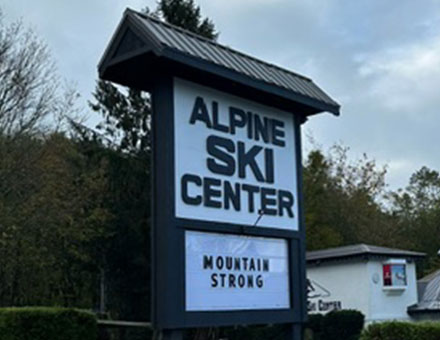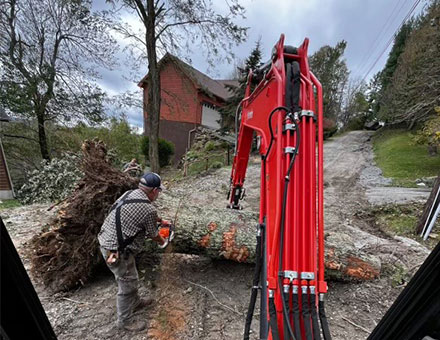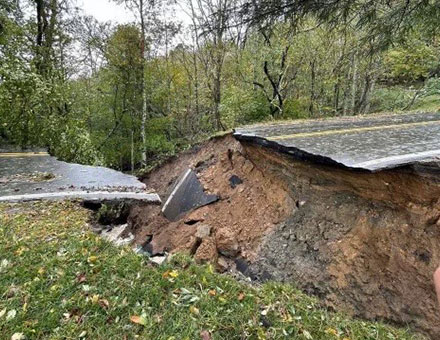 Photo courtesy of Kim Jochl.SAM Magazine—Banner Elk, N.C., Oct. 2, 2024—Ski areas in the mountains of western North Carolina appear to have suffered relatively minimal damage from Hurricane Helene, which caused historic flooding after dropping 1-2 feet of rain, or more, through a wide swath of mountain communities in a short time, Sept. 26-27. While operators are still assessing the damage, the primary focus now is on helping their staff and their communities recover.
Photo courtesy of Kim Jochl.SAM Magazine—Banner Elk, N.C., Oct. 2, 2024—Ski areas in the mountains of western North Carolina appear to have suffered relatively minimal damage from Hurricane Helene, which caused historic flooding after dropping 1-2 feet of rain, or more, through a wide swath of mountain communities in a short time, Sept. 26-27. While operators are still assessing the damage, the primary focus now is on helping their staff and their communities recover.
“The ski area was fortunate to have sustained minimal damage; our damages will be under $100,000,” Appalachian Ski Mountain president Brad Moretz told SAM. “We’ll have a week and a half of cleanup, and some things to fix, replace, and clean, but no major damage to buildings, lifts or snowmaking infrastructure.
“But our local area has been pretty devastated. In the town of Boone (about an 8-mile drive from the ski area), there have been 111 buildings condemned,” he said, adding that he hasn’t heard from any staff members that had catastrophic losses, “but lots of people have lost power, and have road access issues.”
Some Beech Mountain staff members weren’t so lucky, according to marketing director Talia Freeman. “Most of our staff is safe and healthy, but many have experienced severe damage or lost their homes,” she said. “We’re focused on ensuring they are OK and guiding them through this difficult time.”
Banner Elk, which is flanked by Beech Mountain and Sugar Mountain ski areas to the north and south, respectively, was drenched with nearly 15 inches of rain, according to the National Weather Service.
Sugar Mountain vice president Kim Jochl reported, “As of today, all the damage to Sugar Mountain Ski Resort is fixable: drainage damage, slope and parking lot washouts, flooding to the sports shop with some inventory loss. All machinery including lifts are intact and undamaged.”
Jochl also shared relief that Sugar’s last missing employee was finally accounted for Tuesday afternoon.
Cataloochee Ski Area president Chris Bates said the resort had been in contact with all its team members, who are OK. “Some have suffered some damage to their homes and property. We are helping where we can,” he said.
 Damage repairs at Appalachian Ski Area. Photo courtesy of Ric Wilkinson.“We are fine at the ski area, just a few trees down,” he added. The mountain lost power for 35 hours, but it is now restored. “In the valleys, there is a lot of destruction in the lower areas: flooding, and lives, homes, and businesses lost,” said Bates. “Power, and water are still out in a lot of areas.”
Damage repairs at Appalachian Ski Area. Photo courtesy of Ric Wilkinson.“We are fine at the ski area, just a few trees down,” he added. The mountain lost power for 35 hours, but it is now restored. “In the valleys, there is a lot of destruction in the lower areas: flooding, and lives, homes, and businesses lost,” said Bates. “Power, and water are still out in a lot of areas.”
The recovery from Helene will take time, but progress is being made already as community members come together to help. Jochl said the Beech, Sugar, and Banner Elk communities “are close knit and very tight and have pulled together in amazing ways to stabilize the area and move forward.
“The two local grocery stores are cleaning up and are open. Roads and bridges are being fixed—at least to single lane. Water, power, and cell service are trickling in. And the influx of essential supplies, food and water, and machinery has gone beyond generous. Helicopters have been rescuing folks all week. Amazing the way mountain folk work together and at an efficient and productive rate. We are fortunate,” said Jochl.
Freeman shared updates with SAM while she was volunteering in the neighboring town, helping to answer phones while volunteers distribute food and supplies to those in need. She said in the immediate aftermath of the storm, all access roads to the town were compromised. “However, our community came together remarkably, repairing the front road within just two days.
“I’m incredibly proud of our area,” said Freeman.
An update on Appalachian Ski Mountain’s website said the ski area will focus on “supporting and repairing our community infrastructure and assisting our staff and residents as we all begin the repairing & rebuilding process.” Moretz added, “We are looking now into how we can help people that were left homeless in our area.”
In addition, Appalachian’s annual preseason sale has been rescheduled to Oct. 25-Nov. 3, with a portion of sales being donated to relief funds for community members in need.
Helene was a historically catastrophic event, the full extent of which won’t be understood for weeks or even months. And while it was one of the worst storms in U.S. history, major rain events are occurring more frequently in general, and ski areas across the country have felt the wrath, including Lee Canyon, Nev.; Sunday River, Maine; and Giants Ridge, Minn., to name just a few.
Beech Mountain had a rain event last year that caused nearly as much damage as Helene in a matter of just two hours, Freeman added.
 Damage to Beech Mountain Parkway. Photo courtesy of Ric Wilkinson.“I would estimate we have had at least three ‘100-year’ storms in the last decade, but this was clearly the worst in my lifetime, and from what I have read, the worst in over a century,” said Moretz.
Damage to Beech Mountain Parkway. Photo courtesy of Ric Wilkinson.“I would estimate we have had at least three ‘100-year’ storms in the last decade, but this was clearly the worst in my lifetime, and from what I have read, the worst in over a century,” said Moretz.
Ed. Note: I was the communications manager at Mount Snow, Vt., when Tropical Storm Irene hit on Aug. 28, 2011, and the stories I heard from ski area operators in North Carolina were remarkably similar to what I experienced 13 years ago.
The damage our rural mountain communities sustained from Irene was like nothing I’d ever seen before except on TV. Entire roads washed away, homes were destroyed, and people died. It was difficult to imagine the area fully recovering from it.
But, just like what is happening in the mountain towns of North Carolina right now, the residents of our area were galvanized with a single mission to help each other dig out, rebuild, and come back better than before. Local excavators took it upon themselves to rebuild single lanes of road so people weren’t stranded. Neighbors helped those who couldn’t help themselves, delivering food and water via ATVs and tractors.
Mount Snow—like the Beech, Sugar, Appalachian, Cataloochee, and others—thankfully sustained minimal damage from Irene. With the surrounding communities in need, we mobilized our skilled staff members, machinery, and equipment. Plumbers, electricians, mechanics, and machine operators, not to mention most every other Mount Snow employee capable of wielding a shovel and a bucket, went to work helping our neighbors get back on their feet again.
I never want to experience anything like that again, but it was an experience I’ll never forget because it showed the true resilience of rural mountain towns and the people who live in them, many of whom are connected to our ski areas in some way.
Stay strong, North Carolina. It’s daunting now, but you will recover.
—Dave Meeker, Editor, SAM
For those interested in contributing to that recovery, Kim Jochl shared these trusted support agencies to consider donating to:
Here is a website with direct contact info:
https://ncdisaster.ces.ncsu.edu/2024/10/ways-you-can-help-in-hurricane-helene-recovery/
- Baptists on Mission: Baptists on Mission is responding by setting up feeding units and recovery sites in multiple cities and towns. They need volunteers for a variety of efforts—food / water distribution, chainsaw teams, clean-up crews, etc.—and donations can be made to support the work.
- North Carolina Disaster Relief Fund: The North Carolina Disaster Relief Fund is accepting contributions to help with the unmet needs of storm victims.
- American Red Cross: The American Red Cross is on the ground helping people who have been impacted in western North Carolina. Visit their site to find a shelter or make a donation. You can also call 1-800-RED-CROSS (1-800-733-2767) or text “Helene” to 90999 to request assistance anytime.
- Samaritan’s Purse: The organization is mobilizing staff and equipment and enlisting volunteers to provide emergency aid. They often stay behind afterward to rebuild or restore houses for needy families.
- The Salvation Army: The Salvation Army is responding to the disaster by providing emergency aid, food / water, emotional and spiritual care, and critical supplies to survivors and rescue workers. Find active service locations here.




